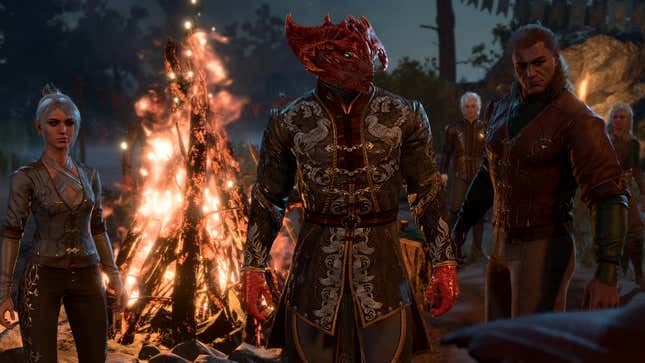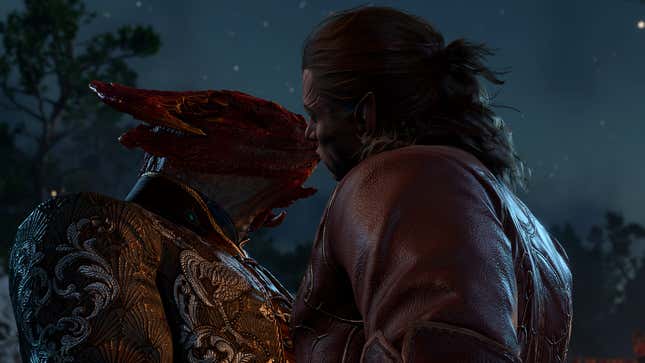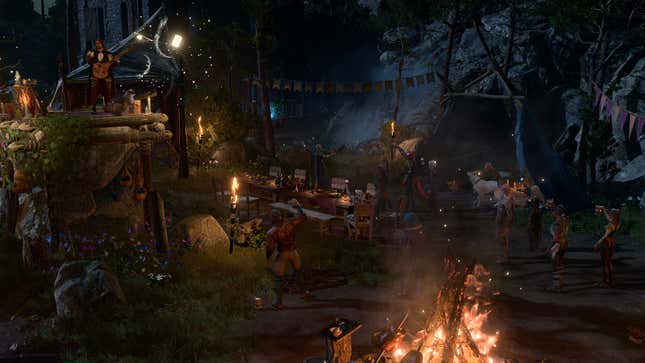When Baldur’s Gate 3 released this summer, its ending was one of the rare moments where praise for Larian’s take on the world of Dungeons & Dragons wasn’t united in effusive lauding. Abrupt, a little messy, and lacking in closure to characters players had just spent hundreds of hours with, it was both interesting and full of friction in equal measure. Should we ever know everything about a story’s end? What should be left to imagination?
While fans have spent three months thinking about that story themselves—what the lives of their “Tav” (the default name for a custom player character), their lovers, their friends, and even their foes were like after the credits rolled—this week Larian decided to offer something a little more definitive. The surprise headlining news of this week’s fifth major patch for BG3 was a brand new playable epilogue, with thousands of lines of new dialogue, new interactions, and more all tailored to weave together hours of player decision-making into a kinder, warmer, more sentimental conclusion to the game. The new epilogue—which can take about an hour, at most, to work through—does exactly that, offering a fascinating chance for Larian to revisit Baldur’s Gate 3‘s immediately iconic and lovable characters through the lens of player reaction after launch, after those all those months of fan art and stories and interactions with the actors behind them. It is filled with joy and love, and the twinge of regret that you are truly saying goodbye to its story and its characters for one final time.
But it is also in many ways something that feels like a celebration of playing D&D itself, and a promise: just as friend groups come to the table to adventure together, and then drift back apart in the hope that some day in the future they will gather as one and venture forth, this is not the time to say goodbye to Baldur’s Gate 3 forever. There could always be something more, should time and fate align (and, in a wonderfully jokey nod to the herculean task of getting a group of adults to sort their own schedules out to play D&D regularly, a synchronization of myriad personal calendars) that brings us back to this particular imagining of Faerûn.

Although you start playing it immediately after credits first roll on a playthrough of Baldur’s Gate 3, the epilogue is set six months after the conclusion of the main story, and more specifically after players choose the ending path that sees them destroy the sinister Netherbrain, freeing their friends, and the Sword Coast, from the tadpole-wriggling grip of the Mindflayers and their reborn Illithid Empire. Picking up your character and their loved one via an invite from Withers—the ancient mysterious undead entity that, it turns out in BG3‘s original end, was an agent of the gods working against the machinations of the Dead Three, Myrkul, Bane, and Bhaal—the epilogue takes place at the very first encampment your party came together in during the events of the game, the sentimental stage to host a reunion feast for people who, for the most part, all went their separate ways after saving the day.
Depending on the many, many, many choices you made over the course of your game, where those characters all come from, or even who’s alive to return in the first place, will be different. I played the epilogue on my very first “Tav,” Lhukesh the Dragornborn Paladin, so I got to learn that, even as the original game saw them briefly part ways with their lover, the Elven Druid/Notable Bear Halsin, they had in fact reunited shortly thereafter, retired from the heroic life, and built a family life for themselves looking after refugees and orphans displaced by the Mindflayer crisis. I got to see the ramifications of a lot of the choices I’d made with Baldur’s Gate 3‘s party flourish, for the most part.

A japing jab with Jaheira, the perpetual grandmother of the cast here, a heartfelt thanks there from the likes of Astarion, Shadowheart, and Lae’zel, for the impact Lhukesh had on improving their lives for the better and widening their worldviews from their brusque, selfish origins. Some of it was bittersweet—Gale the Wizard, for the example, apparently perished forever after I failed to convince him of the hubris of playing with the ancient magics that had been used by the Dead Three to control the Netherbrain for their own ends, leaving behind a magical hologram of himself to say a final goodbye and apology. Some of it even felt like it bordered on undoing what could’ve been perceived as a tragic ending from the original game—like Karlach and Wyll gleefully telling me that, after months of fighting in the hellish planes of Avernus, they had found a way to fix Karlach’s infernal engine, a plan in mind to undo the dire fate that nearly kills her by Baldur’s Gate 3‘s original climax.
One the one hand, the sentimentality feels earned. The epilogue might be playable immediately after the main game concludes, but for a lot of players this is going back after months away from Baldur’s Gate 3 in one form or another. And while Larian’s post-launch support of the game, through new content, quality of life updates, and bug fixes has largely been exemplary, this epilogue feels like the developer saying, for the most part (outside of rudimentary bug fixes), it’s done adding new things to the game: Baldur’s Gate 3 is as Baldur’s Gate 3 is in this moment. It was nice, great even, but it’s time to pick ourselves up and bid it farewell. That vibe is suffused throughout the epilogue, as characters, almost hesitant to a whisper, try to acknowledge that this might be the last time they’re all together. As you wander around the celebrations every character is burdened with this unspoken tension: let’s tell each other how much we mean to each other, let’s hug our friends, let’s kiss our loved ones, let’s promise to always be there for each other even when we’re apart, just in case this is it.

But it doesn’t have to be. Of course, metatextually, a player can revisit Baldur’s Gate 3 whenever they want, replay old saves, start new run throughs, create new characters and try new classes. It’s a video game, it’s not going to poof into the ether the second you’re done playing. But the epilogue also acknowledges this within the text itself. When you’re done catching up with your party, speaking to Withers to bring the epilogue to its conclusion sees the undead gather you all around the table to raise a glass in celebration of each other—that you all came together to beat impossible odds and defy the machinations of the gods themselves. Crucially, however, Withers is much less definitive about this being the End as many of your friends were in conversation. As a being keenly aware of the threads of fate, and the wheels of destiny ever turning, Withers plainly tells you that this night might lead to more—not just future reunions, but future threats to deal with, new adventures to be hand that brings the latest batch of heroes of Baldur’s Gate together once more.
Many players have taken this as a tacit acknowledgement from Larian that, contrary to prior statements, it’s not as done with Baldur’s Gate 3 as it first said it was after launch. This tease, it’s believed, could come in the form of expansive DLC, or perhaps even a Baldur’s Gate 4 down the line. Neither would be surprising, given the overwhelmingly positive reception Baldur’s Gate 3 has enjoyed. But as much as it does feel like a hint at more to come from this world for them, it also just feels like the perpetual promise of TTRPGs themselves, D&D or otherwise. TTRPGs are all about the stories and characters you weave on the table, yes, but they’re also intrinsically about the players behind those adventures. Their connection to each other, the experience of coming together to create something unique and meaningful, and then drifting apart. They might not get the chance to do it often as real life and commitments interrupt, they might not get to do it again at all. They might get to do it regularly for years and years to come. But the potential for a return and more is always there, and always so captivating, no matter if it’s ultimately the eventual outcome. The stories can go on forever, grow and evolve and take new forms, or create new ones entirely, but the connections made along the way can always be reforged no matter how much distance or time comes between them.

It’s a fitting sentiment to conclude Baldur’s Gate 3 on, and a 2023 that has seen Dungeons & Dragons itself weather a dizzying array of highs and lows. A farewell and a farewell-for-now in equal measure, it’s also a celebration of that promise of playing TTRPGs in the first place: bringing people together in, as you raise a goblet to as Baldur’s Gate 3 fades to black one last time, health, wealth, love, and above all, problems worth solving.
Want more io9 news? Check out when to expect the latest Marvel, Star Wars, and Star Trek releases, what’s next for the DC Universe on film and TV, and everything you need to know about the future of Doctor Who.
Trending Products

Cooler Master MasterBox Q300L Micro-ATX Tower with Magnetic Design Dust Filter, Transparent Acrylic Side Panel, Adjustable I/O & Fully Ventilated Airflow, Black (MCB-Q300L-KANN-S00)

ASUS TUF Gaming GT301 ZAKU II Edition ATX mid-Tower Compact case with Tempered Glass Side Panel, Honeycomb Front Panel, 120mm Aura Addressable RGB Fan, Headphone Hanger,360mm Radiator, Gundam Edition

ASUS TUF Gaming GT501 Mid-Tower Computer Case for up to EATX Motherboards with USB 3.0 Front Panel Cases GT501/GRY/WITH Handle

be quiet! Pure Base 500DX ATX Mid Tower PC case | ARGB | 3 Pre-Installed Pure Wings 2 Fans | Tempered Glass Window | Black | BGW37

ASUS ROG Strix Helios GX601 White Edition RGB Mid-Tower Computer Case for ATX/EATX Motherboards with tempered glass, aluminum frame, GPU braces, 420mm radiator support and Aura Sync










